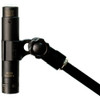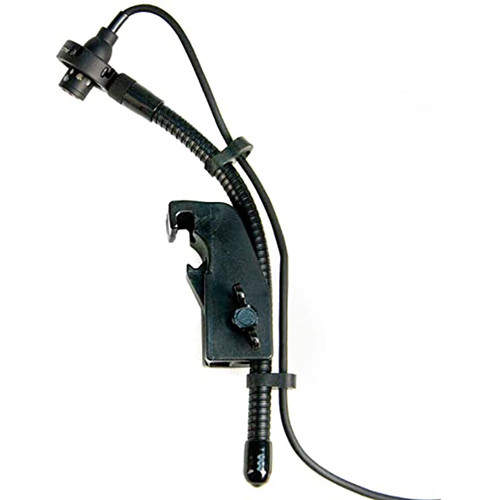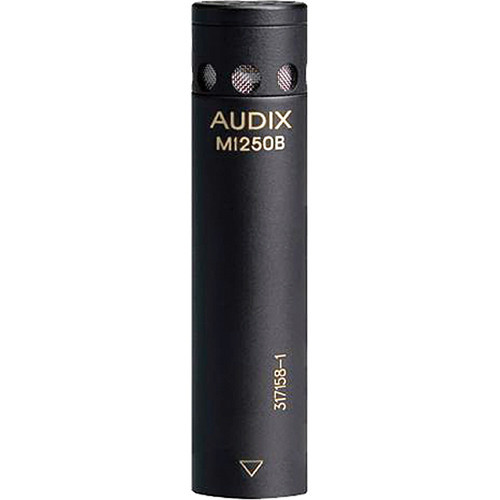The Audix SCX1 Condenser Microphone is a professional studio cardioid condenser microphone designed for a wide variety of recording, broadcast and live sound applications.
The Audix SCX1 Condenser Microphone is known for its high sensitivity, pin-point accuracy, low profile and consistency. With a smooth uniform frequency response from 40 Hz - 20 kHz, the Audix SCX1 is very consistent when responding to on and off-axis signals, and exhibits excellent phase coherence and minimal proximity effect. The Audix SCX1 is characterized with a wide cardioid polar pattern; this, coupled with the high output and sensitivity of the microphone, makes the Audix SCX1 an ideal choice for miking overhead, drums, instruments, room ambience, orchestral sections, stringed instruments, piano, vibes and sound effects. The Audix SCX1HC condenser microphone is a number one choice for miking hi-hat both live and in the studio. Other features include a 21 mm gold vapor capsule, miniaturized electronics and an extremely small footprint. The Audix SCX1 will handle sound pressure levels of 130 dB and will provide up to 20 dB of ambient noise rejection. In addition to acoustic instruments, the Audix SCX1 is an excellent choice for group vocals, speech or Foley work. The Audix SCX1HC has become a popular choice for interior dialogue boom pole miking. It has a precision machined brass body, interchangeable capsules, black multi-layer class ‘A' liquid finish and gold plated XLR connector. The Audix SCX1 studio condenser microphone is manufactured to exacting standards and tight tolerances.
Audix SCX1 Condenser Microphone Applications
- Studio vocals, group vocals
- Speech
- Overheads, hi-hat
- Orchestra, symphony
- Acoustic stringed instruments
- Piano, vibes, flute, bells, chimes, mariba
- Audience mics for in ear monitors
Audix SCX1 Condenser Microphone Features
- Professional, studio quality cardioid condenser
- Extremely sensitive with pin-point accuracy
- 21 mm gold vapor capsule with modular design
- Designed, machined, assembled & tested in the USA
Audix SCX1 Condenser Microphone Specifications
- Transducer Type: Condenser
- Frequency Response: 40 Hz - 20 kHz
- Polar Pattern: Cardioid
- Output Impedance: 200 Ohms
- Sensitivity: 26 mV / Pa @ 1k
- Equivalent Noise Level: 14 dB (A-Weighted)
- Signal to Noise Ratio: 80 dB
- Maximum SPL: =130 dB
- Dynamic Range: 116 dB
- Power Requirements: 48-52 V Phantom
- Connector: 3-Pin XLRm
- Polarity: Positive Pressure on Diaphragm Produces Positive Voltage on Pin 2 Relative to Pin 3 of Output XLR Connector
- Materials / Finish: Machined Brass / Black Finish
- Weight: 114 g / 4 oz
- Length: 104 mm / 4.1 in
Audix SCX1 Condenser Microphone Includes
- Audix SCX1 Condenser Microphone
- Foam Lined Wooden Case
- DCLIP Microphone Clip
- WS81C External Windscreen
- 3 Year Warranty
1 Review Hide Reviews Show Reviews
-
Used it in Live Situations
Sep 12th 2010I have only used this mic extensively in the live sound world on Piano, Choirs, and Acoustic Guitar. It seems to be low on sensitivity scale as I always have some trouble with gain before feedback unless the source is really close to the element. Do you know how hard it is to get people comfortable singing in a choir group with a mic and mic stand over the top of them? It is my workhorse as far as small condenser mics go for live sound, but it's because it's all my company owns. Not sure I would buy it knowing that Neumann KM184's are out there unless I was on a budget. Has a midrange that makes a grand piano sound honky around 530 and 800. Might need a good preamp to bring it to life.
Write a Review














 Sign Up for exclusive sales and offers!
Sign Up for exclusive sales and offers!